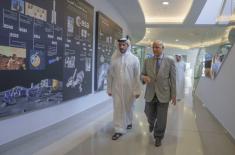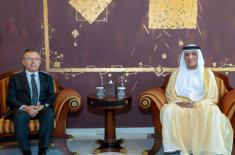
CJP Reiterates Conformity Between Bench & Bar
Umer Jamshaid Published August 05, 2025 | 07:00 PM

ISLAMABAD, (UrduPoint / Pakistan Point News - 5th Aug, 2025) The Chief Justice of Pakistan, Mr. Justice Yahya Afridi, accompanied by Mr. Justice Junaid Ghaffar, Chief Justice of the High Court of Sindh, met today with a delegation of the Sindh High Court Bar Association at the Supreme Court Branch Registry, Karachi.
The delegation was led by SHC Bar Association President, Barrister Muhammad Sarfraz Ali Metlo and comprising Mr. Muhammad Rahib Lakho, Vice President, Mirza Sarfraz Ahmed, Honorary Secretary, Mr. Athar Ali Memon, Honorary Treasurer, Mr. Waseem Saif Khoso, Honorary Joint Secretary, Ms. Safia Qadir, Mr. Aamer Latif, Ms. Zahida Kamal Alvi, Mr. Muhammad Aamir Khosa, Mr. Rizwan Ali Rajpar, Mr. Muhammad Faisal Khan, Ms. Urooj Akhlaq, Mr. Deewan Tara Chand and Mr. Ubedullah Abro, Members Managing Committee and Mr. Rehan Aziz Malik, Ex-President.
According to a press note released here Tuesday, the Chief Justice of Pakistan warmly welcomed the delegation and reaffirmed that the Bench and Bar are integral components of a justice system. He stressed that the shared mission of delivering justice cannot be achieved without the close cooperation of the legal fraternity, assuring that he would not allow any factor to disrupt this vital meaningful partnership.
Briefing the delegation, the Chief Justice outlined the ongoing reform agenda being implemented through the Law and Justice Commission of Pakistan (LJCP). He apprised them of the measures taken for the welfare of the legal fraternity, including their inclusion in decision-making processes and policy development for the justice sector. Notable initiatives include the solarization of bar premises and the integration of IT solutions (e-libraries) to enhance bar’s technical abilities in remote areas.
It was reiterated that the decision was taken after a consultative process and collective input.
He further shared significant decisions taken at recent meetings of the LJCP and the National Judicial (Policy Making) Committee (NJPMC), which he chaired. These decisions include ackling the issue of enforced disappearances and the creation of a dedicated committee to propose an institutional response; directives to High Courts to devise mechanisms to safeguard judges from external influence; establishment of Commercial Litigation Corridors and Model Criminal Trial Courts for speedy adjudication; timelines for the disposal of 13 categories of cases; piloting a Double-Docket Court Regime; institutionalization of court-annexed mediation; and adoption of a Professional Excellence Index to elevate. Additionally, the NJPMC formed a committee forstandardization of recruitment, training, and service conditions for the district judiciary.
In response, the President of the Sindh High Court Bar Association expressed gratitude to the Chief Justice for the initiatives undertaken for the legal community. He highlighted challenges faced by the fraternity and proposed the establishment of Model Civil Courts for the swift adjudication of the oldest civil cases. The Chief Justice welcomed these suggestions and assured that they would be placed before the relevant forums for due consideration.
The meeting concluded with a reaffirmed commitment to strengthening judicial efficiency, transparency, and accessibility, underscoring the indispensable partnership between the Bench and Bar in ensuring the effective delivery of justice.
Recent Stories

ZayedCHF marks 33rd anniversary of impactful charitable works worth AED2 bn in 1 ..

2nd ‘Donate Your Own Device’ aims to collect 100,000 electronic devices to e ..

Sultan bin Ahmed reviews latest developments at SAASST

Saud bin Saqr receives Ambassador of Türkiye

Egypt's net international reserves reached more than US$49 billion at end of Jul ..

Dubai Airshow 2025 launches future-facing conference programme to drive global a ..

Gargash receives outgoing Ukrainian Ambassador

SEC issues decision to form Police Judicial Council in Sharjah

US uses Hollywood film Marriage Story clip to scare off wolves in Oregon

DPM Dar asks India to revoke all illegal actions taken against IIOJK

Irthi celebrates 10 years of empowering artisans, promoting handcraft heritage g ..

Youm-e-Istehsal being observed to express solidarity with IIOJK today
More Stories From Pakistan
-
Sharjeel Memon praises Sindh Police for exemplary role in restoring law and order
8 minutes ago -
Youm-e-Istehsal-e-Kashmir observed in Sialkot
8 minutes ago -
Bilawal reiterates Pakistan's support for Kashmiris on Youm-e-Istehsal
8 minutes ago -
CM Maryam pays tribute to sacrifices of Kashmiri people
8 minutes ago -
CJP reiterates conformity between Bench & bar
8 minutes ago -
LHC commends Punjab govt's efforts in environmental protection
8 minutes ago
-
Hyderabad district administration hosts Youm-e-Istehsal rally to show solidarity with Kashmiris
9 minutes ago -
MNSUA organizes lecture, takes out rally in support of Kashmiri people
9 minutes ago -
PM calls SMEs engine of inclusive growth, innovation & employment empowering Pakistan
18 minutes ago -
529 FIRs registered against traffic violators
18 minutes ago -
Rescue 1122 observe Youm-e-Istehsal-e-Kashmir Day in Rawalpindi
18 minutes ago -
WASA directed for crackdown against chronic defaulters for 100% recovery
18 minutes ago